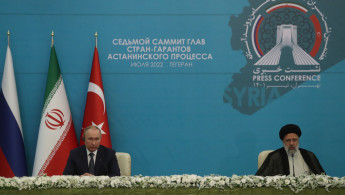Five takeaways from Iran, Russia, Turkey's Tehran meeting
A meeting between the leaders of Russia, Turkey, and Iran took place in Tehran this week, discussing three of the world's most talked-about political events - Syria, the Iran nuclear deal, and the war in Ukraine.
The Tehran summit was officially part of the so-called Astana Platform, which Tehran, Moscow, and Ankara convened in the Kazakh capital to, officially at least, deescalate tensions in Syria.
All three are currently, and to varying degrees, at loggerheads with the US, with the meeting taking place shortly after President Joe Biden convened his own summit of Arab allies in Jeddah in an apparent warning to Iran and Russia against their own regional ambitions.
We look at five key events from the Tehran summit and how they might impact global affairs.
1) Erdogan's defiant stance on Syria
Reports of a potential new Turkish offensive on Kurdish elements in northern Syria have surfaced over the past two weeks, raising tensions in an already fraught area.
Both Iran and Russia had urged Turkey against taking military action in Syria but President Recep Tayyip Erdogan left the tripartite talks on Syria with a defiant tone.
"What we expect from Russia and Iran is their support for Turkey in its fight against terrorism," Erdogan said.
The Turkish president highlighted an agreement reportedly struck by Turkey, Russia and the US in 2019 which gave Ankara the right to push Kurdish militants 30km away from its southern border.
"This still has not happened," said Erdogan. "It is a long overdue."
He also told Washington to leave Northeast Syria, where US forces are aiding the Kurdish-dominated Syrian Democratic Forces (SDF)
2) Iranian support for Russia's Ukraine invasion
Turkish drones have been a key component in Ukraine's fightback against Russia's invasion, with reports emerging over the past weeks that Moscow might be pinning its hopes on Iranian expertise to the turn the tables on Kyiv.
Shortly before Putin flew out the Moscow, the US accused Russian generals of visiting Iran with plans to purchase Iranian drones, although any announcement of a military deal at the Tehran summit was forthcoming.
Perhaps more significant was Iranian Supreme Leader Ali Khamenei's apparent endorsement of Russia's invasion of Ukraine, which followed a more muted criticism of Kyiv back in March.
"In the case of Ukraine, had you not taken the initiative, the other side would have taken the initiative and caused the war," Khamenei told Putin.
"NATO would know no bounds if the way was open to it. And if it wasn’t stopped in Ukraine, it would start the same war sometime later using Crimea as a pretext."
3) Grain exports from Ukraine
A blockade on Ukrainian ports has led to dire food shortages and inflation in many parts of the world, not least the Middle East. An UN-Turkish push to end the embargo came to fruition after the Tehran summit, with an announcement on Thursday that the siege on Ukrainian ports would end and an agreement signed on Friday.
Yuri Ushakov, Putin’s foreign policy advisor, said prior to the meeting that the issue would "100 percent" be discussed by Erdogan, Putin, and Iran President Ebrahim Raisi.
It is hoped the export of grain from Ukraine will ease the hunger crisis currently being felt in many parts of the world.
4) Iran and Russia sign $40 billion energy deal
Iran and Russia's national energy companies - National Iranian Oil Company and Gazprom - signed a landmark Memorandum of Understanding (MoU) this week.
According to the deal Gazprom will be involved in the extraction of oil and gas at several sites across Iran potentially worth $40 billion.
While preliminary agreements, such as MoMs, often do not come to fruition, the Iran-Russia deal was still a powerful statement as both countries deal with US sanctions and Moscow threatens to cut gas supplies to Europe.
5) The waiting game
In what appears to be a battle of egos, Putin was left waiting for his Turkish counterpart at a press conference for 50 awkward seconds as journalists filmed the bemused Russian president.
It follows an incident in 2020, when Erdogan was held up by Putin at the Kremlin, amid a scrum of photographers, for two whole minutes.
Some have suggested Erdogan's waiting game was payback for the 2020 humiliation.





 Follow the Middle East's top stories in English at The New Arab on Google News
Follow the Middle East's top stories in English at The New Arab on Google News


